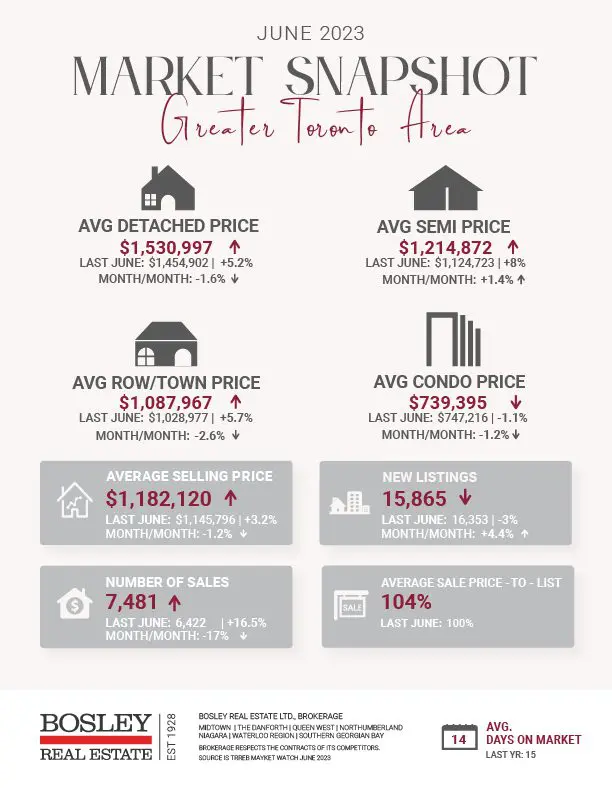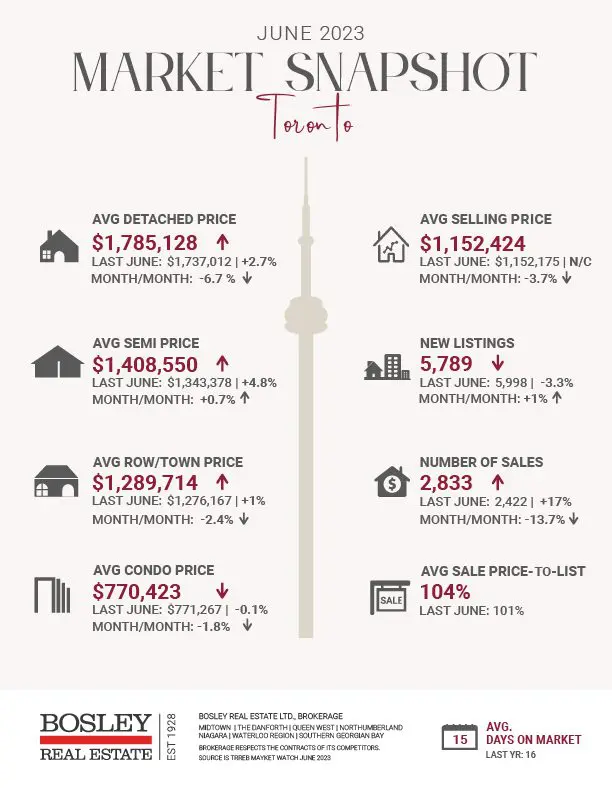

MARKET INSIGHT FOR THE WEEK ENDING July 21st, 2023
Rents for GTA condos continue to soar, hitting an average of about $2,800 a month in the second quarter of 2023, an almost 32 per cent rise over the last two years. And the spike in rents has been even higher for micro units under 400 square feet.
“I’d say it’s alarming as this growth is occurring off of record highs from a year ago,” said Shaun Hildebrand, president of Urbanation. “There is a point where, and I think we’ve already reached, that the market becomes unaffordable and you start to see some resistance, and unfortunately the only relief is people leaving the city.”
The vacancy rate for purpose-built rental buildings is up slightly from 1.5 per cent a year ago to 1.9 per cent, but still very low.
Hildebrand blames sky-high rents on a “confluence of factors” including a strong job market, rising interest rates, high home prices that shut out first-time home buyers, and immigration. As well, more people are doubling- and tripling-up with roommates to be able to afford more.
If tenants want to live alone, they’re going to be shelling out for even the smallest spaces. Micro condos had the highest annual rent growth, of 15 per cent in the second quarter of this year, with an average rent of $2,121.
“I think this is a direct correlation with just how expensive the market has become,” said Hildebrand. “There really isn’t anything that runs for under $2,000 a month anymore.”
Meanwhile, they can build more micro units — too small for a child or even a pet — for a higher price per square foot. This does result in more supply, “but on the other hand,” said Hildebrand “is it really the type of supply that we need for the long term?”
There were 17,542 new condo units registered during the 12 months ending in June 2023, and nearly 37 per cent were rented through the real estate board, up from 31 per cent at the same time last year.
This suggests, said Hildebrand, that despite some investors losing money due to rising mortgage payments, some are hanging on as a “long-term investment.”
What happens in this environment is that tenants become “house poor” spending more than 50 per cent of their income a month on rent with little left over for basic necessities. They also end up taking on “peculiar” arrangements like staying in the same place as a partner after they’ve broken up or dividing a one-bedroom among three roommates.
Condos that were built after 2018 are not subject to rent control in the province, meaning that in the new towers going up “fast and furious” across the GTA tenants can be “economically evicted,” through huge yearly rent hikes.
The move toward smaller units, reflects the fact that condos make up a big chunk of the rental stock in the region, and they are increasingly not a place to raise a family or live long-term.
Here are the top 5 trending stories of the week:
- When rate hikes stop, the real estate market will heat up, developer says “Following a move by the Bank of Canada to increase its policy rate this week, one real estate developer said the latest rate hike provides a sense of certainty to the market, which he thinks will heat up once interest rates stop moving higher. Barry Fenton, president and chief executive officer of Lanterra Developments, said in a panel discussion with BNN Bloomberg Wednesday that interest rates are not the “full driver” of the real estate market. He said that he was “actually pretty happy” that the recent rate hike brought certainty. “
- Canada’s housing agency says starts surged in June to slightly reverse downward trend “Canada’s housing agency says the annual pace of housing starts in June posted its largest month-over-month increase in a decade to slightly reverse a downward trend seen in recent months. Canada Mortgage and Housing Corp. says the seasonally adjusted annual rate of housing starts in Canada totalled 281,373 units in June, up from 200,018 in May as there was a spike in activity in the more volatile mutli-unit category. “
- Interest rate hikes have returned. But don’t expect home prices to drop “Two consecutive interest rate hikes from the Bank of Canada are expected to cool the national housing market after activity heated up in the spring, but experts warn supply is too tight for further price drops.”
- What is NIMBYism and how is it affecting how much housing is getting built? “A housing crisis is well underway in Canada, and experts say the problem is only made worse by residents who oppose new housing developments. While the sentiment, known commonly as Not In My Backyard (NIMBY), existed long before the housing shortage became pronounced, experts say counteracting it is more important now than ever before. “
- You now have to make more than double minimum wage to afford rent in Toronto “While it’s well-known that hardly anyone who wants to settle down in Toronto will ever be able to afford to buy a home here, the ever-increasing cost of living in the city has meant that a large chunk of its residents can’t actually afford to rent here, either.”

The Bosley Advantage
Read about the heritage and innovation that form the foundation for Bosley’s industry-leading approach to real estate.







